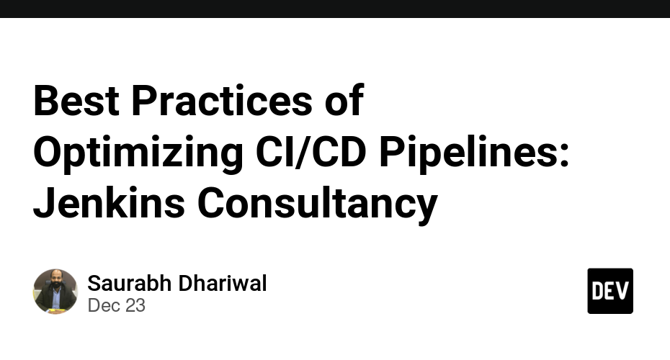Dev
2d
229

Image Credit: Dev
Best Practices of Optimizing CI/CD Pipelines: Jenkins Consultancy
- Jenkins Consultancy helps in optimizing CI/CD pipelines through Jenkins by providing expertise, best practices, and on-the-ground support. CI/CD is a process for continually integrating code changes followed by automated testing and then deploying the validated code to the production. Optimizing Jenkins CI/CD pipeline involves pipeline as code, shared libraries for reusability, parallel testing, applying Docker for environment consistency, and optimizing build time. Establish quality gates to determine whether the pipeline should proceed to the next stage based on predefined criteria is highly recommended.
- A properly set up Jenkins CI/CD pipeline has constituting stages including source code management, build management, testing frameworks, artifact management, deployment solutions, and monitoring and reporting. Engaging with Jenkins consultancy services is essential as it caters to specific needs and customizable solutions for an organization. Continuous improvement in software delivery is possible by adopting these best practices.
- Pipeline as Code provides defining your CI/CD process, making traceability easier. Same tooling is used to keep testing deployment processes uniform. Running tests in parallel significantly reduces build times and configuring it through plugins and resource management, ensures ample resources availability. Docker containers to run builds and tests can improve environment consistency, and custom images hold dependencies for better builds.
- Monitoring performance and managing logs regularly is essential, and tools like Prometheus and Grafana can help in monitoring, whereas the Jenkins monitoring plugin in Jenkins keeps track of system performance. Logging strategies can be implemented using ELK stack for centralized logging. Optimizing CI/CD pipelines in Jenkins involves technical competencies and best practices, along with tailored guidance and support for quick and efficient adaption to the changes in the market.
- Integrating security scanning tools in pipelines is significant in identifying vulnerabilities early during the development cycle. Static analysis tools like SonarQube can automatically scan code for vulnerabilities. Dynamic testing can be done through integrating OWASP ZAP during deployment. Failing the build early if quality metrics do not meet expectations is cost-effective as it saves time and resources and allows for quick intervention.
- Investing in Jenkins Consultancy is investing in a foundation for continuous improvement in software delivery. Adopting best practices results in optimized workflows and faster software delivery that is high quality and reliable. Adopting these best practices ensures keeping up with and staying ahead of competition. Engaging with a team of experienced Jenkins consultants caters to unique challenges and objectives, ultimately leading to sustained success.
Read Full Article
13 Likes
For uninterrupted reading, download the app